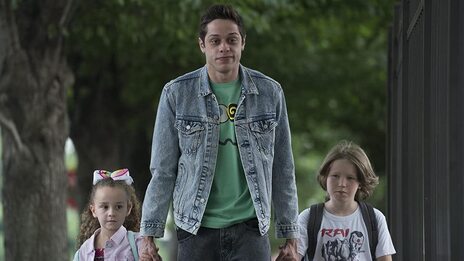C+ | A young man still haunted by the death of his firefighter father moves from no responsibilities to some responsibilities. Directed by Judd Apatow Starring Pete Davidson, Marisa Tomei, and Bill Burr Review by Jon Kissel |

Scott’s mom Margie (Marisa Tomei) indulges her layabout son because her life has been frozen just as much as his. The only Carlin moving forward is sister Claire (Maude Apatow), a rising college student who never knew her father. Claire’s scared for both Scott and her mom, casting herself as the glue in the family and unsure if they can cope without her. Margie adjusts to this change by expanding her life, dating another firefighter in Ray (Bill Burr). Scott resists this development at first but surrenders in his own gradual way, walking Ray’s kids to school and getting a job as a busboy. In spending time with Ray and his fellow firefighters, Scott manages to forgive his dad for putting his own life at risk and gets more comfortable with expressing his feelings towards his on-off-girlfriend Kelsey (Bel Powley). The film ends with Scott only as far as Manhattan, but the film acknowledges that it’s a big step from where he used to be.
If this is Apatow’s heaviest film (it’s either this or Funny People), it’s also his least funny. That’s not automatically a negative, as it’s about a man reconciling with his father’s long-ago death, but my understanding of Davidson’s humor is a willingness to engage with dark subject matter. That doesn’t translate here, as even the attempts to laugh at darkness are leavened by the aforementioned torso hugs: that scene works, sure, but it’s not a funny scene at its core. The most laughs are generated from Scott’s disastrous tattoos that he inks on his friends, but that’s something like three instances. Several actors, especially Burr, are looking for laughs in volume and exasperation, and there’s not much there.
Apatow doesn’t have to make a riotous comedy every time, and The King of Staten Island’s preference for drama might be a sign of maturity from the director and a public self-examination from Davidson. In both regards, more focus would’ve been appropriate. Like all Apatow films, this one’s too long. It contains parts that seem to exist solely to bring in some of Davidson’s favorite people. The tone cannot handle an attempted robbery that could conceivably end in murder. Both the robbery plot and everything at Scott’s busboy job could be cut: get him into the firehouse faster and the movie could be done in 90. The chemistry and the rapport aren’t so good that it’s fun to hang out in Scott’s various spaces. The length of the film also takes away from Davidson-as-confessor, like he wanted to do this big important thing to help the public know a controversial figure better but he also wanted to be seen dicking around for big chunks of time.
The weighting of the drama part of dramedy here provides actors like Burr and Maude Apatow to show off a broader skill set. Burr’s own semi-autobiographical show on Netflix, F Is For Family, contains several powerful rebukes to repressive masculine culture, and his voice-work is behind most of them. Apatow has to work hard to shed the whiff of nepotism that swirls around her, and between this and Euphoria, I’m ready to give her the benefit of the doubt. Steve Buscemi as a wizened firefighter is great, pulled from his own life story (look it up), Arias is an adorable little weirdo, and Ricky Velez ably plays a heightened version of his stand-up persona.
This is Davidson’s film as much as it’s Apatow’s, and I wish the former exerted more control. The darker version of this story would undoubtedly have improved on Apatow’s well-worn formula, and it’s not going to be Apatow who’ll bring a dark story all the way to life. He can’t help himself with diversionary scenes like the restaurant boxing match, a sequence that adds nothing, isn’t funny, and made me a little sweaty with the idea of fist-fighting for tips after a long night waiting tables. The King of Staten Island is meant as a tongue-in-cheek backhander to Scott, but Davidson needed to exert more monarchical power over this film, maybe with Apatow in a producer role instead of directing. I believe, based on what’s here, that Davidson has the vision and the chutzpah to make a perceptive and meaningful pseudo-comedy about anger and grief. This is a fine attempt, but it’s not that. C+
 RSS Feed
RSS Feed